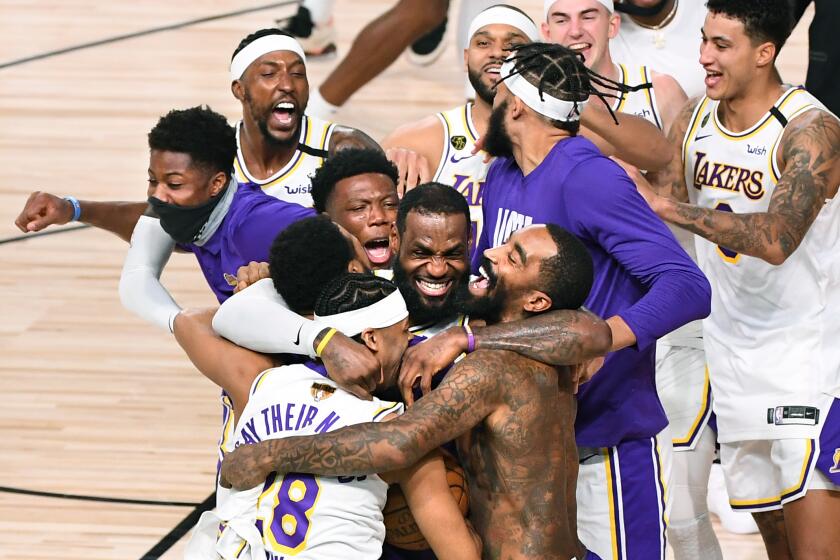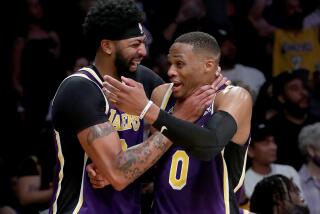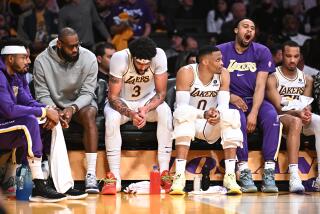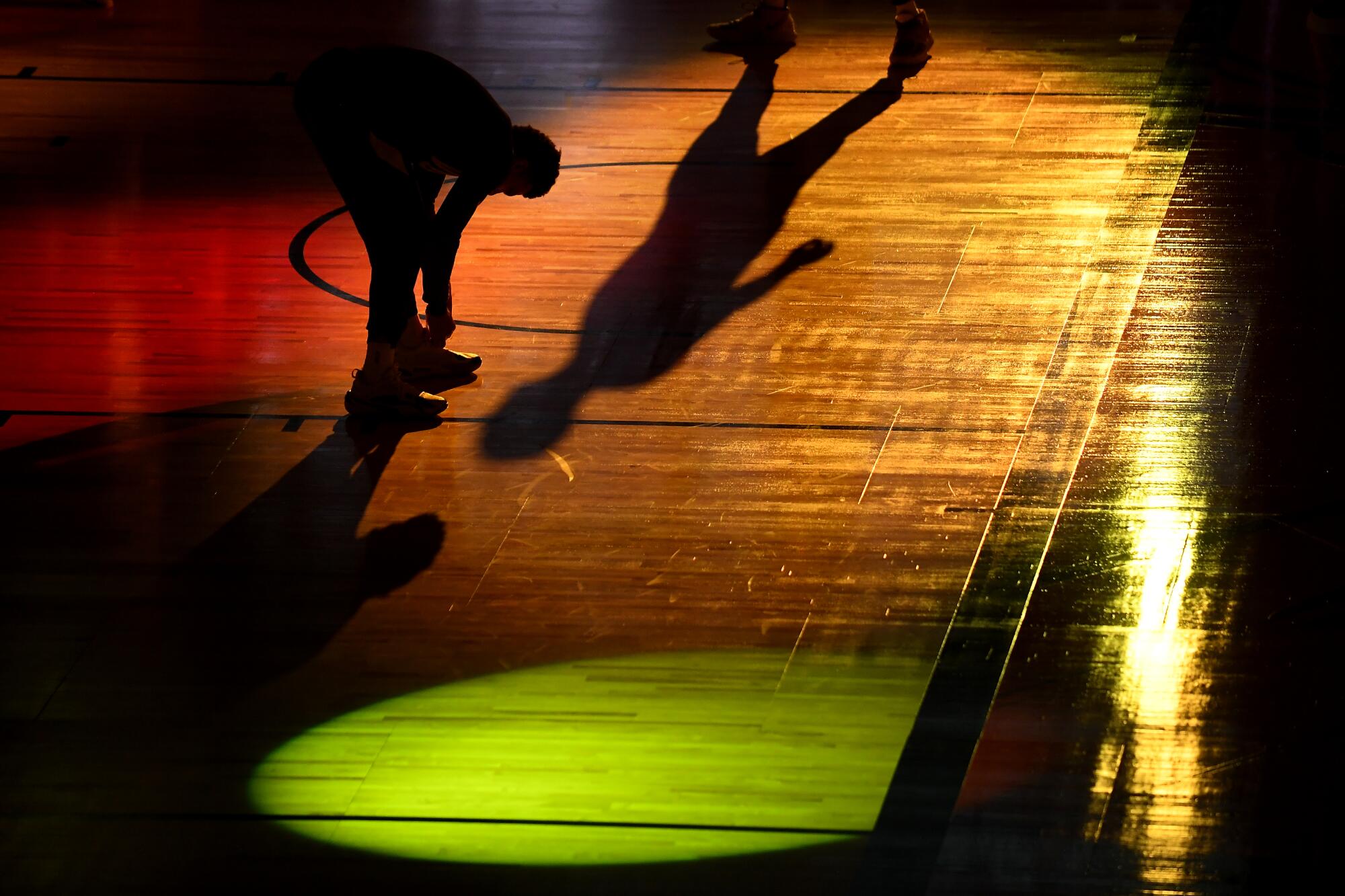
- Share via
ORLANDO, Fla. — Lakers guard Danny Green bounced down the hallway that led to the team’s locker room, the start of a long night of partying after the team won the 2020 NBA championship Sunday.
“Free. We’re free,” he said, his voice echoing off the walls. “Freedom. I’m f— free.”
The NBA leaves the bubble behind, the experience a major success. The league has finished its season, helping satisfy its obligations to television partners. It has finished its season, crowning a champion without losing a single game to a COVID-19 outbreak. And it’s provided players the opportunity to try to better the world by speaking out about injustice.
So if the pandemic continues to cause problems, if safety cannot be guaranteed anywhere else, the league could end up back here sometime in the future, right?
“No way,” one NBA veteran said.
While the NBA hasn’t ruled out the possibility of returning to a bubble environment for the 2020-21 season, it’s an obvious last resort because of the effects it had on players.
Complete coverage from the Lakers’ championship season
It’s a shared sentiment among players here in the bubble — that the experience was too difficult, too disruptive and too isolating to replicate.
“It’s probably been the most challenging thing I’ve ever done as far as a professional, as far as committing to something and actually making it through,” Lakers star LeBron James said before the NBA Finals. “But I knew when I was coming what we were coming here for. I would be lying if I sat up here and knew that everything inside the bubble, the toll that it would take on your mind and your body and everything else, because it’s been extremely tough.”
Michele Roberts, executive director of the National Basketball Players Assn., spent the entire restart on campus just like the players. The experience wasn’t always easy to navigate.
Roberts said the early days of the bubble were great, making her feel “like a kid in a candy store” because of the interactions with players from 22 teams that were still fighting for playoff position.
“When I first got here and all the teams were here, it was all the way live,” Roberts said. “We could not not run into players and have conversations with them.
“For the first couple of weeks, I was kind of digging it.”
But as the days began to pile up, so did the exhaustion. Then the Aug. 23 shooting of Jacob Blake in Kenosha, Wis., pushed everyone over the edge. After the Milwaukee Bucks refused to play, players gathered to figure out what to do. After intense meetings, players from all over the league, including some of its biggest stars, gathered outside to smoke cigars and drink, a desperately needed escape.
“Mentally, it’s kind of like ‘Groundhog Day’ in here. If you’re not playing well, the walls are gonna close in on you more and more.”
— Danny Green, Lakers guard on the gameday and off-day routines in the NBA bubble
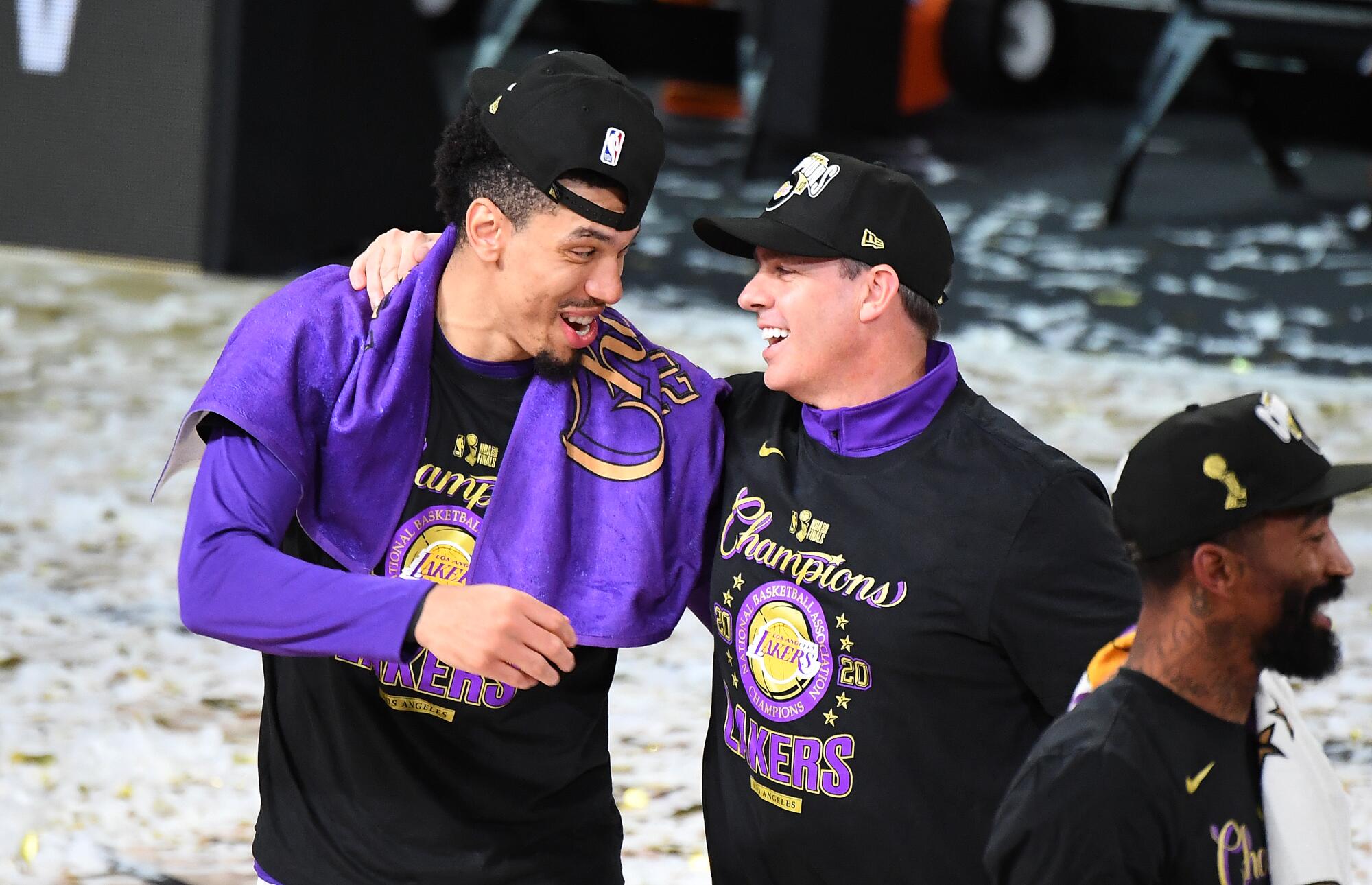
“Mentally, it’s kind of like ‘Groundhog Day’ in here,” Green said after teams decided to keep playing. “I don’t want to make it seem that bad, but the bubble is as good as your play, you know? You don’t have many escapes or outside distractions. If you’re not playing well, the walls are gonna close in on you more and more.”
Take Clippers forward Paul George, who went through a horrific slump in the first round of the playoffs, his “Playoff P” nickname becoming a running online joke. It shook him.
“I underestimated mental health, honestly,” George said after rediscovering his jumper. “I had anxiety, a little bit of depression, just being locked in here. I just wasn’t there. I checked out.”
Even before teams entered the bubble, mental performance specialists and health experts knew players would be in for a grind. While some would look at the setup — alone in a hotel with a single job, to play basketball — as a distraction-free environment, the isolation actually could cause more distractions.
“We don’t want to be like Tom Hanks in ‘Cast Away,’ living by ourselves on an island. It’s horrendous,” mental skills coach Graham Betchart said before players entered the bubble. “My guess is this will be the hardest thing ever. Being away from your family, being away from your friends, that’s torture.
“I think this will shift how people look at mental training. It’s something where you have to do it proactively — not reactively.”
Lakers center Dwight Howard admittedly struggled with the bubble.
“Tt could be very difficult. So I just tried to find a way to escape mentally by doing a lot of reading, getting out and walking, talking to a lot of the people ... “
— Dwight Howard, Lakers center who said he felt depressed on occasion in the NBA bubble
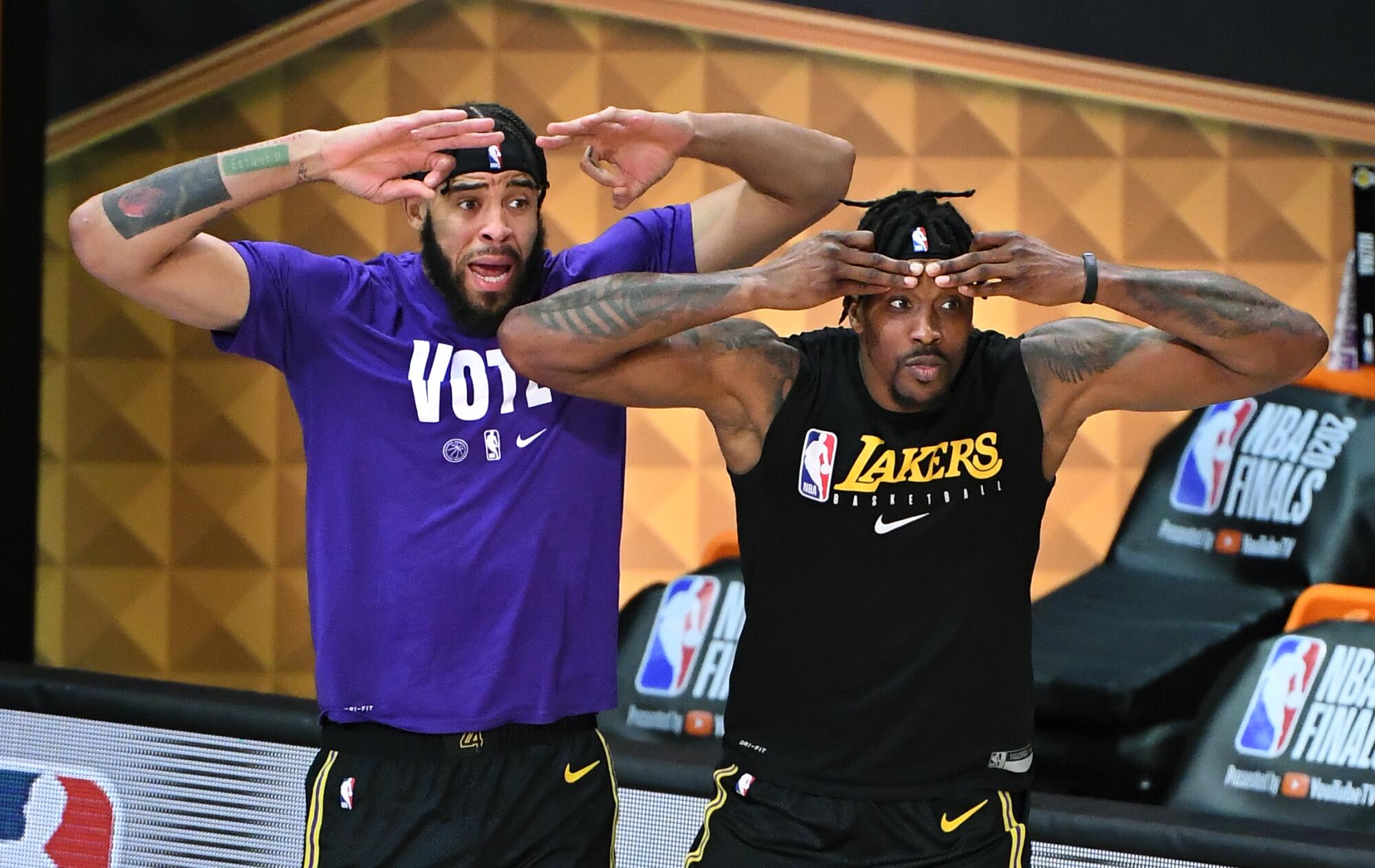
“For myself, there [have] been times where I was depressed about just having to be in the bubble, not being able to see my family, my kids,” Howard said during the Finals. “So, it could be very difficult. So I just tried to find a way to escape mentally by doing a lot of reading, getting out and walking, talking to a lot of the people who work from the NBA who are here and experiencing the bubble as well. So just trying to share my experiences with them and to listen to their experiences and find hope within each other.”
The Lakers were among the teams to have a sports psychologist among their traveling parties. On campus, there were multiple resources available for anyone who needed help. There was an on-site psychologist as well as telehealth resources.
As people filled out a daily medical questionnaire, they were always asked whether they would like a mental health and wellness professional to reach out.
NBA Commissioner Adam Silver acknowledged that getting family members and friends on campus before the second round of the playoffs would’ve been better but that it was a “balancing act” because more people meant more risk of a COVID-19 outbreak.
“There was no doubt, if you talked to our panel of scientists, doctors, experts, they say especially when you start introducing new people into the environment, as the season went on, the playoffs went on, you were introducing additional risks,” Silver said before the Finals. “On the other hand, you had the mental wellness of people who were separated from partners, spouses, children for long periods of time.
“And so, it did weigh heavily on me.”
If the NBA were to return to some sort of bubble to start next season, league sources said the bubble would need to expand for an increased family presence.
Complete coverage from the Lakers’ championship season
Roberts came to Orlando without any family or friends — save for two cats.
“It was kind of a secret because I didn’t know about the players wanting to bring pets, and I wasn’t even sure if Disney was going to allow it,” she said. “I said, ‘Would it be real trouble if I brought my cats?’ And they said no.”
Roberts said both cats were old, and one, Precious, was close to dying. So she brought them to the bubble, where, as she expected, Precious died.
“Having them here was a comfort because everyone’s got their support system,” Roberts said. “Some of us have children, some of us have grandchildren. So I’ve got that covered with nieces and nephews. I’ve got no children … but I also have always had pets, and so I’m grateful that they were here and I’m grateful that the one that passed did it with me right here.”
Staying connected with the real world was a challenge. It made players feel helpless at times as they wanted to join in the fight for social justice. It also led to feelings of guilt in some because the bubble existed without the pandemic-inspired stresses that so many others were facing.
With a presidential election on the horizon, the isolation in the bubble made players and staffers feel as if they weren’t living in the same world as everyone else. Reentering the real world could be a stressor.
“Obviously, we know when we leave here we’ll be thrown back into the fire, the chaos of it all. We’ll see how it goes,” Miami Heat guard Duncan Robinson said. “You know, it’ll come with its challenges. Habits are developed over the 90-plus days we’ve been here. You have your daily routines that are going to have to change. That’s just how it goes. The same adjustments that you made coming here, you make them leaving. It really is what it is.”
Inside, everyone just did their best to fill time.
“A hundred-plus days in the bubble is not an easy thing. And I couldn’t have done it without the brotherhood of these guys.”
— Rob Pelinka, Lakers GM talking about the players, coaches and staff.
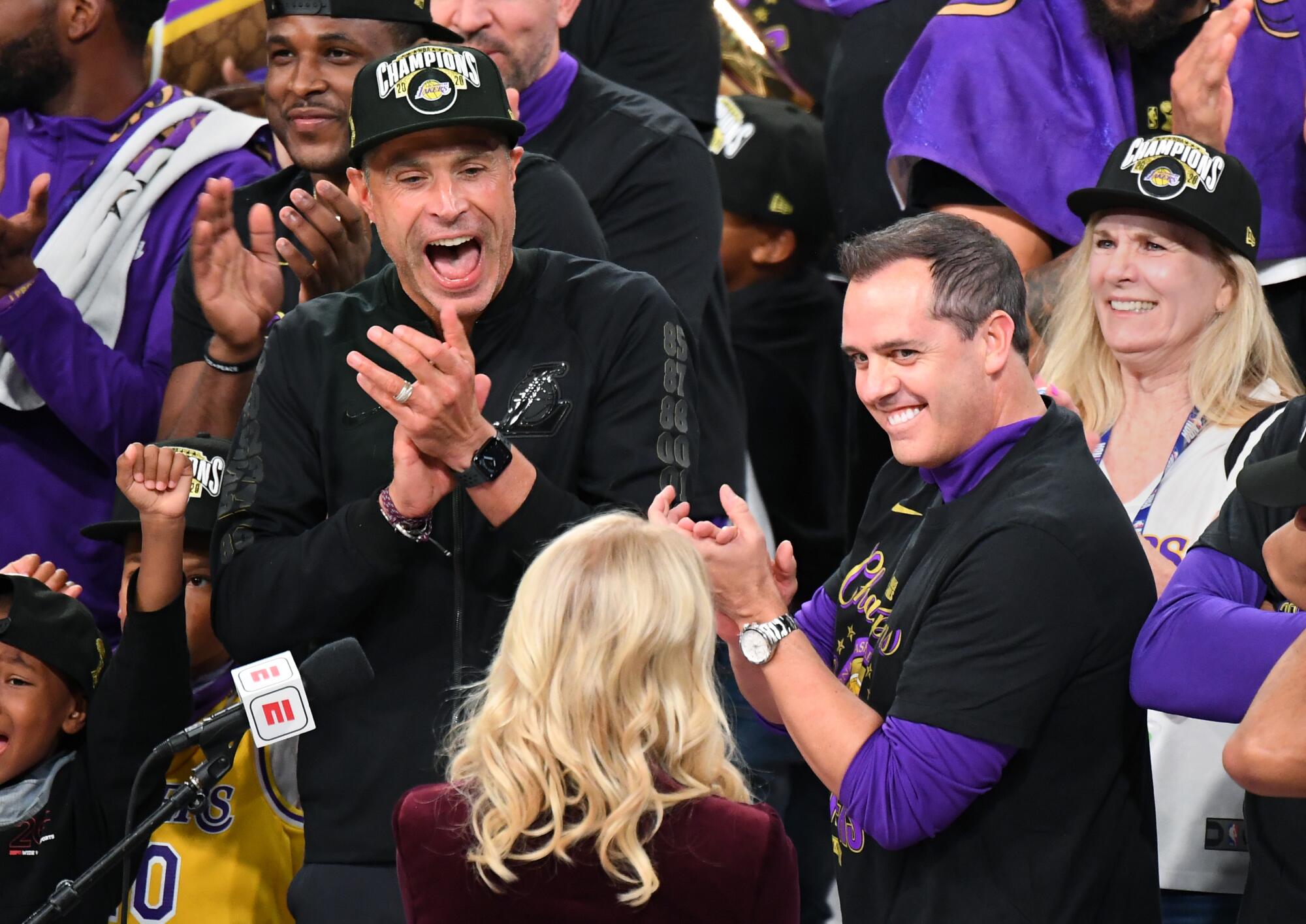
For Roberts, it was her work and her pets. For others, it was bike rides around the perimeter. Lakers general manager Rob Pelinka would spend hours swimming laps and running around the campus, filling time while he still processed and grieved the losses of Kobe and Gianna Bryant.
He said the belief that their spirit was pushing the team gave him “strength beyond strength.”
“With the togetherness of our group, the adversity we went through drew us together. I think in life, you can’t fight your battles alone. You fight your battles with your brothers and sisters,” Pelinka said after the Lakers won the title. “A hundred-plus days in the bubble is not an easy thing. And I couldn’t have done it without the brotherhood of these guys, the coaching staff, the training staff. Just an amazing group of people.”
That’s how the Heat felt about their team too, and it’s probably not a coincidence that the two teams left in the end shared that.
Yet even for the strongest-minded players in the world, the bubble was a grind.
As James walked into the Lakers’ first practice before the NBA Finals, he was reminded by a reporter that the team had been on campus for 85days.
“Feels like five years,” James said.
More to Read
All things Lakers, all the time.
Get all the Lakers news you need in Dan Woike's weekly newsletter.
You may occasionally receive promotional content from the Los Angeles Times.

